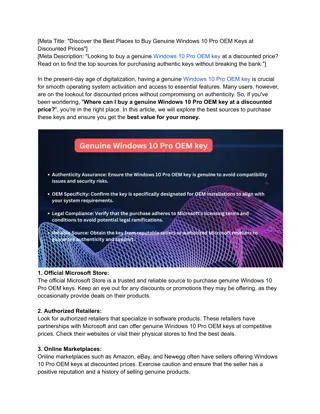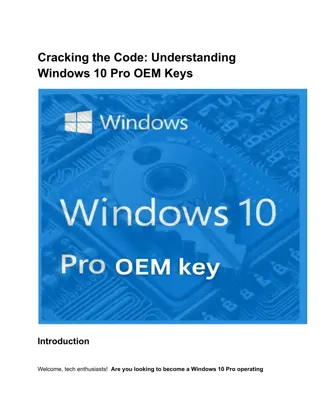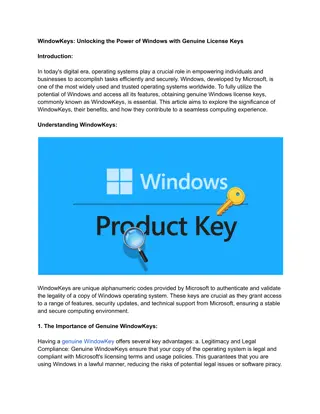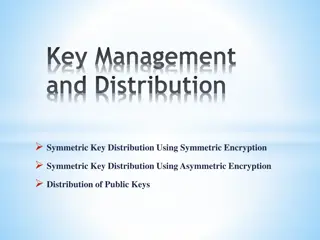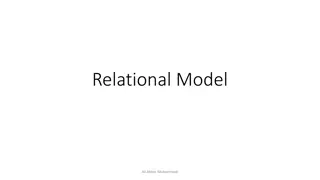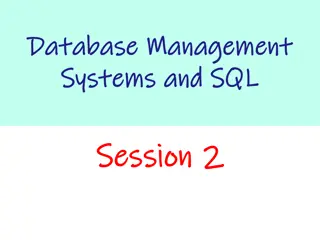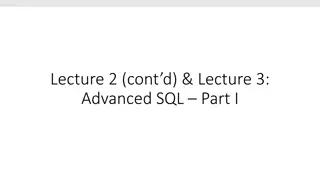
Effective Board Governance: Roles, Responsibilities, and Functions
Learn about the importance of effective board governance, including the roles, responsibilities, and key functions of governing boards. Explore how boards establish strategic direction, ensure necessary resources, and provide oversight to support organizational success.
Download Presentation

Please find below an Image/Link to download the presentation.
The content on the website is provided AS IS for your information and personal use only. It may not be sold, licensed, or shared on other websites without obtaining consent from the author. If you encounter any issues during the download, it is possible that the publisher has removed the file from their server.
You are allowed to download the files provided on this website for personal or commercial use, subject to the condition that they are used lawfully. All files are the property of their respective owners.
The content on the website is provided AS IS for your information and personal use only. It may not be sold, licensed, or shared on other websites without obtaining consent from the author.
E N D
Presentation Transcript
Bridges to Change Board Service
What is Governance From Greek word kubernan, to steer To govern is to steer, to control, and to influence from a position of authority
Governing Boards Come in a variety of structures, compositions, etc., but are always where the proverbial buck stops : Granted authority by state and supporters to represent public trust and ensure the organization carries out the purposes for which it was established in a responsible and accountable fashion Where organization s legal responsibilities rest
Board vs. Staff Policy Board policy supports staff policy Staff Policies Board Policies
Six Key Functions of an Effective Board 1. 2. 3. 4. 5. 6. Provide mission and vision oversight Support the Executive Director Ask good questions Provide financial accountability Facilitate connections Give financial support
3 Primary Roles of the Board 1. 2. 3. Establish direction Ensure resources Provide oversight
Primary Board Responsibilities 1. Establish Strategic Direction Determine mission and purpose Ensure effective planning 2. Ensure the Necessary Resources Ensure adequate financial resources Select the chief executive Build a competent board Enhance the organization s public standing 3. Provide Oversight Monitor and strengthen programs and services Protect assets and provide financial oversight Ensure legal and ethical integrity Support and evaluate the chief executive
Board Role 1: Establish Strategic Direction Set the mission and vision Ensure effective planning Philosophical and strategic (long-term) planning Not necessarily tactical (annual) planning Monitor the plan, ensure impact Engage in strategic thinking
Board Role 2: Ensure the Necessary Resources Ensure adequate financial resources Select the executive director Build a competent board Enhance the organization s public standing
Boards and Diversity Diverse boards are in a better position to remain relevant, effective, and grounded in the needs of the community Diverse boards can prevent group think Diverse boards are more likely to attract diverse donors and volunteers
Enhance the Organizations Public Standing An accurate image and positive reputation will influence organizational resources Success of most organizations depends on external relations Board needs to ascertain that stakeholders are kept informed
Board Role 3: Provide Oversight Monitor and strengthen programs and services Protect assets and provide financial oversight Approve the budget Review monthly or quarterly financial statements Ensure adequate financial controls and that financial reports are in accordance with acceptable accounting practices Approve and review reserve and investment policies Oversee the audit Review the Form 990 before it is filed
Board Role 3: Provide Oversight Support and evaluate the executive director annually Include the full board in the evaluation Ensure the evaluation is in writing Ensure legal and ethical integrity Ensure important policies are in place such as Conflicts of interest (with annual disclosure) Code of ethics Whistleblower Document retention and destruction
Summary: Board as a Collective Body Establishing Strategic Direction Planning Ensuring the Necessary Resources Human Resources Financial Stability Community Relations Providing Oversight Organizational Operations Financial Management
Importance of Board-CEO Relationship Exceptional boards govern in constructive partnership with the chief executive, recognizing that the effectiveness of the board and the chief executive are interdependent. - BoardSource s The Source: Twelve Principles of Governance That Power Exceptional Boards
Characteristics of Effective Board CEO Partnerships 1. 2. 3. 4. 5. Shared understanding of mission and vision Clear roles and responsibilities Open and honest communication Mutual respect Two-way evaluation
Three Hats of Individual Board Member LegalHat = The 3 D s Duty of Care Duty of Loyalty Duty of Obedience Ambassador Hat for the Organization Volunteer Hat for the Organization
Governance: Legal Obligations Duty of Care Using your best judgment Actively participating, paying attention Asking pertinent questions Duty of Loyalty Avoiding conflicts of interest Putting aside personal and professional interests Duty of Obedience Staying true to the organization s mission Obeying the law, both public and organizational
Ambassador for the Organization Secondary importance to governance But, strongly recommended since: Board members are in a better position to do this than others (more authority / clout) Organizational sustainability is critical Examples might include giving presentations about the cause / organization, educating elected officials, and writing newspaper editorials
Volunteer for the Organization Least important of board member responsibilities But, can help: Board members understand the organization Build a positive organizational culture Board members are merely volunteers in this role, NOT in charge, NOT possessing higher authority, NOT acting on behalf of the board
What we need from board members Actively Participate Provide time, talent, and treasure Attend meetings/events Serve on committees, carry out assignments Help raise money Be Informed About mission, programs Prepare for meetings Stay current with related issues and organizations Ask questions
What we need from board members Actively Participate Provide time, talent, and treasure Attend meetings/events Serve on committees, carry out assignments Help raise money Be Informed About mission, programs Prepare for meetings Stay current with related issues and organizations Ask questions
Build a Competent Board Identify Rotate Cultivate Celebrate Evaluate Recruit Orient Educate Involve Source: Berit M. Lakey, The Board Building Cycle: Nine Steps to Finding, Recruiting, and Engaging Nonprofit Board Members, Second Edition (BoardSource, 2007). 23
A good board is a victory, not a gift. ~ Cyril O. Houle Governing Boards
A good board is a victory not a gift. ~ Cyril O. Houle Governing Boards


